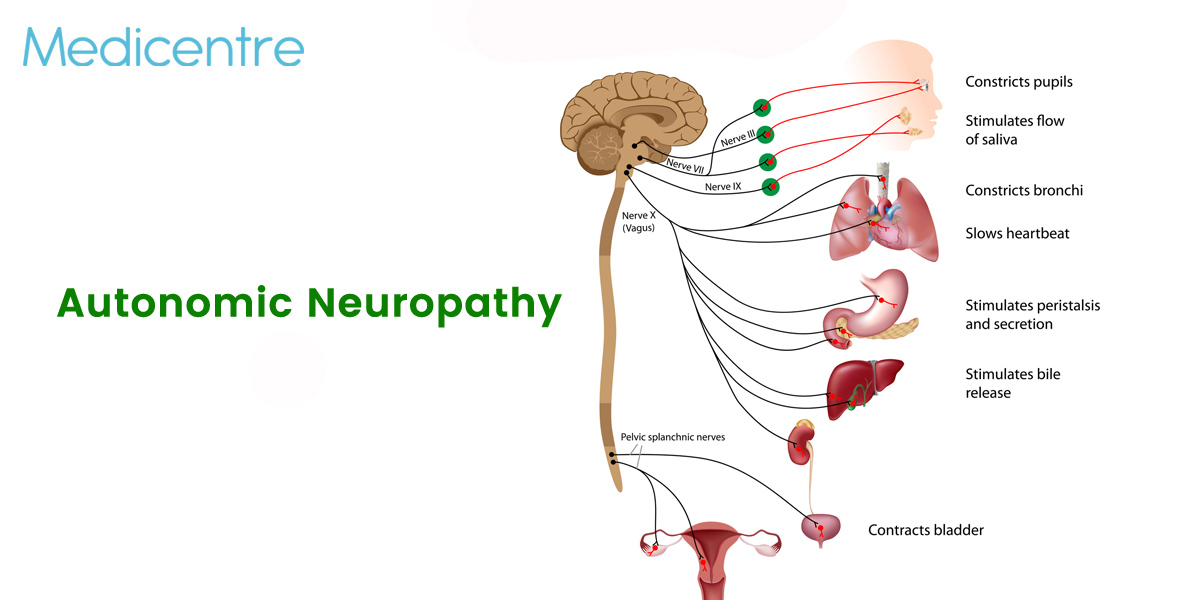Autonomic Neuropathy
Autonomic Neuropathy is the medical condition of nerve which impacts the involuntary body functioning and this includes the perspiration, blood pressure, heart rate and digestion. The condition is not specific and it characterized by damaging of the autonomic nerve in body and this damaging interfere the signals between the autonomic nervous system and brain and this includes the sweat glands, blood vessels and heart. The condition may further lead to abnormal or reduced performance of one or more involuntary body functions. The Autonomic Neuropathy can be the resultant of certain condition or disease. There are medications to treat Autonomic Neuropathy but has side effects too. The symptoms and treatment options for Autonomic Neuropathy vary depending upon the nerve that is affected and the underlying cause.

Symptoms of Autonomic Neuropathy
As mentioned, the signs and symptoms of Autonomic Neuropathy vary depending upon which part of autonomic nervous system is affected. The signs may include:
- Fainting and dizziness
- Sexual dysfucntioning
- Urinary issues
- Difficulty in digesting the foods
- Excessive or abnormality in sweating
- Exercise intolerance
How Autonomic Neuropathy is Caused?
Autonomic Neuropathy is the condition which is caused by a variety of conditions and diseases and it can also be a side effect of medication or treatment prescribed for diseases that are not related to nervous system. Some of the common causes of Autonomic Neuropathy are:
- Abnormal protein building in organs which affect the nervous system
- Diabetes which can damage the nerve across the body and cause Autonomic Neuropathy
- Autoimmune Diseases where the immunity attacks and damages the parts of body including nerves
- Injury in the nerves
- Chronic illness like Parkinson’s
- Treatment with drugs
- Inherited disorders
What are the Risk Factors of Autonomic Neuropathy?
- Diabetes which is poorly controlled increases the chance of developing nerve damages including the Autonomic Neuropathy. The risk increases in people that are having the diabetes for more than 25 years and there is a difficulty in controlling the glucose levels.
- There are a variety of illness which also increases the risk of developing Autonomic Neuropathy and this includes systemic lupus erythematosus, amyloidosis, and other autoimmune diseases.
Test and Diagnosis
Autonomic Neuropathy is the condition that may be caused due to other diseases and the testing that you need to undergo depends on whether or not you have the risk for Autonomic Neuropathy. The diagnosis become more challenging when you have the symptoms of Autonomic Neuropathy and the underlying cause is still not aware. Some of the tests which are performed by doctors to confirm Autonomic Neuropathy include:
- Breathing tests where the blood pressure and heart rate is measured to know how you are responding to the breathing exercise
- Tilt-Table Test – This is the test to monitor how blood pressure and heart rate respond to the chances of position and posture. It is also monitor how you respond when you stand up and lying down
- Gastrointestinal Test is also done to check how your digestive system is working and to notice if there are any abnormalities.
- Quantitative Sudomotor Axon Reflex Test which evaluates how the nerves reasonable for regulating sweat glands are responding to stimulation.
- Thermoregulatory Sweat Test is also done to confirm the presence of Autonomic Neuropathy
- Urodyanmic test is also performed if you have urinary symptoms
- Ultrasound is also done if you have any bladder symptoms
Treatments for Autonomic Neuropathy
The treatment plan for Autonomic Neuropathy depends on the underlying cause and the treatment plans include:
- Treating the underlying cause of Autonomic Neuropathy and hence doctors would perform tests to find out the underlying cause and treat it to minimize the symptoms of Autonomic Neuropathy. It is effective way to stop the symptoms of Autonomic Neuropathy from progressing
- Management of the specific signs can also relieve the symptoms of Autonomic Neuropathy. The treatment plan is based on which part of the body or nerve is affected.
Remember, there are different treatment plans available for Autonomic Neuropathy and it depends on the type of symptoms and underlying causes. So, discuss with your doctor and let them know about your symptoms so that tests can be done to rule out the underlying cause and treatments can be started accordingly.